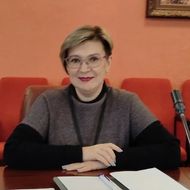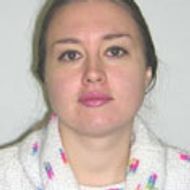HSE Perm Hosts First Intercampus Symposium on Corpus Linguistics
Representatives from all HSE campuses, as well as those from Petrozavodsk State University, attended the symposium 'Corpus Linguistics and Academic Discourse Research: The HSE University Experience'. The scientists shared the results of their research in the field of academic discourse study and discussed current problems and opportunities in the use of corpora in foreign language seminars. The symposium was organised by the School of Foreign Languages at HSE University-Perm.
Studies using corpus methods can be devoted to a wide variety of issues, but they are united by a common methodology: the examination of huge arrays of linguistic data that are processed using computer tools. Elizaveta Smirnova, Associate Professor of the School of Foreign Languages at HSE Perm, presented an analysis of a corpus of articles published in leading scientific journals. Olga Lyashevskaya, Professor of the School of Linguistics at HSE Moscow, spoke about quantitative research based on the REALEC corpus.
Natalia Smirnova, Associate Professor of the School of Foreign Languages at HSE St Petersburg, described the methodology and results of research based on a sociolinguistic corpus for the study of academic writing practices. And Margarita Klimova, Associate Professor of the Department of Applied and Fundamental Linguistics at HSE Nizhny Novgorod, showed the results of corpus studies aimed at identifying spelling errors in students’ English papers. Dmitry Tulyakov, Associate Professor of the School of Foreign Languages at HSE Perm, outlined the main types of discourse markers in the corpus of students’ projects in English.
The symposium ended with the roundtable discussion 'Use of Corpora in Foreign Language Class', where the participants exchanged their experience of using language corpora in teaching. Nadezhda Barymova, Senior Lecturer of the Department of French and German Languages at Petrozavodsk State University, spoke about developments in the field of the university’s educational corpora, and Olga Lyashevskaya, Professor of the School of Linguistics at HSE Moscow, shared her experience of using the Russian Constructicon database.
Nadezhda Barymova, Senior Lecturer at the Department of French and German Languages of Petrozavodsk State University

It was a great honor for me to present the experience of Petrozavodsk State University in the field of corpus linguistics at the intercampus symposium of HSE. It is worth noting a high level of preparation and conduct of the scientific event. All the reports, as stated by the organizers, were devoted to a variety of issues, but that is why a whole range of areas of corpus linguistics use are interesting. After a prolonged period of the pandemic and associated restrictions, it was a pleasure to meet in person, discuss plans and outline possible options for cooperation.
I thank all the colleagues who have shown a great interest in our Petrozavodsk annotated corpus of texts. I hope that our developments will find their place in joint research. As for my impressions of the city, this is my first visit to Perm. Unfortunately, I only had time for an evening stroll around the city center, but I hope to come here again.
Margarita Klimova, Associate Professor of the Department of Applied and Fundamental Linguistics of HSE Nizhny Novgorod

I was very glad to participate in the symposium and even more glad that it was held offline, because I was lucky enough to meet in person with colleagues with whom I had previously communicated only online. In my opinion, our communication turned out to be fruitful, each report was accompanied by a meaningful discussion.
From the main part, I especially remember the reports of my Perm colleagues from the HSE Scientific and Educational Laboratory of educational corpora – Elizaveta Smirnova and Dmitry Tulyakov, who spoke about the latest results of the Perm division of the laboratory. The roundtable discussion was bright due to the reports by Olga Lyashevskaya, who spoke about the development and application of the Russian Constructicon, and Nadezhda Barymova, whose report was devoted to another linguistic resource — the educational corpus of the Petrozavodsk annotated corpus of texts. Thanks to the rich programme of the symposium, I learned a lot of new and useful things for research and teaching.
Thanks a lot to organizers! Perm is a very hospitable city, and HSE Perm is the best proof of this.
Elizaveta Smirnova, Associate Professor at the School of Foreign Languages, Academic Supervisor of the Foreign Languages and Intercultural Communication in Business programme

We have been engaged in corpus research for a long time, and the symposium was a great opportunity to share the results of our work with both colleagues and students. It was nice that the event aroused interest among the students of the Foreign Languages and Intercultural Communication in Business programme. I think that next year the study of language corpora may become the topic of their term papers, and then their final qualifying works.
The event was attended not only by the representatives of all four HSE campuses, but also by a colleague from Petrozavodsk State University – Nadezhda Barymova. As part of the roundtable discussion, she spoke about the experience of creating a corpus of students' works in German and French and the use of this corpus in foreign languages teaching. Cooperation with PetrSU is very valuable for us. Since the corpora collected in the Scientific and Educational Laboratory of educational corpora are in English, PACT (Petrozavodsk Annotated Corpus of Texts) could be an excellent additional material for studying the characteristics of students' written speech in a non-native language for the laboratory staff.
I hope that the symposium "Corpus Linguistics and Academic Discourse Research” marked the beginning of annual meetings on this topic. I would like to thank Elena Shadrina and Marina Sheveleva for their support, thank all the speakers for their participation and express my deep gratitude to Olga Zhenina for her help in organizing this event.
Marina Sheveleva, Associate Professor of the School of Foreign Languages of HSE Perm

The intercampus laboratory of educational corpora has been working fruitfully for 3 years. Events that involve personal communication and the exchange of research experience are very important, since they help to generate new ideas and establish scientific ties. We really hope that this symposium can become an annual event, and in the future turn into a conference on corpus research. Especially pleasant was the interest in the event of colleagues from other universities and cities, as well as students of the educational programme "Foreign Languages and Intercultural Communication in Business”.
Comment from a first-year student of the Foreign Languages and Intercultural Communication in Business programme
I have attended the scientific symposium for the first time (as a listener). The event was devoted to the application of corpus linguistics methods in academic discourse study. The research works by the employees of four HSE campuses were presented there. For me, a first-year student of the Foreign Languages and Intercultural Communication in Business programme, the symposium was interesting and useful.
As a result of the event, I gained new knowledge, interesting and useful: both the essence of the application of the methods and tools of corpus linguistics and the practical significance of such research were presented quite clearly and easily (even for a “neophyte”). Thanks a lot to all the speakers and participants of the roundtable discussion!
In addition, attending an academic event is a great way to keep yourself mentally fit. New topics, new problems, new concepts, they all allow you to see new horizons for your development. I would also like to express my special gratitude to the organizers of the event: the symposium is well scheduled and arranged.

